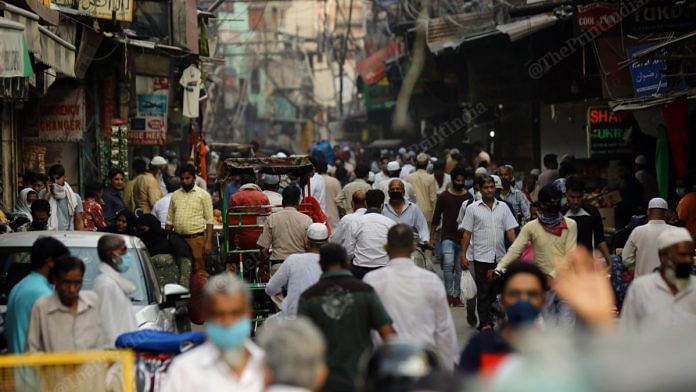New Delhi: The central government is set to start deliberations on officially declaring Covid-19 an endemic disease, top sources in the Union Health Ministry told ThePrint Monday. This comes days after the World Health Organization (WHO) announced that the disease was no longer a public health emergency of international concern (PHEIC).
“For some time now, the pattern of the disease in the country has been stable and despite a slight rise in baseline cases in March and April this year, there was no worrying spike in the number of hospitalisations and deaths,” said an official in the public health division of the health ministry, adding that these are signs of a disease being endemic.
“With the latest declaration from the WHO, it may therefore be prudent to officially declare the viral disease as endemic in the country, and a meeting of the Covid-19 task force would be called soon,” added the official, who wished not to be named.
The US Centers for Disease Control and Prevention says the term ‘endemic’ “refers to the constant presence and/or usual prevalence of a disease or infectious agent in a population within a geographic area”.
According to health ministry data, India Monday recorded 1,839 fresh Covid-19 infections, while the number of active cases came down to 25,178 from 27,212. The case fatality rate stood at 1.18 per cent with 15 deaths being recorded Monday. The daily positivity rate was 1.71, while the recovery rate was over 98 per cent till Sunday.
According to government data, the positivity rate in many parts of the country had reached 5 per cent in March and April. It even crossed the 20 per cent mark in several cities, including Delhi. However, the majority of the infections were mild and hospitalisations were also low, according to reports.
When Covid-19 was declared a global pandemic in March 2020, the number of cases worldwide had grown 13-fold in just two weeks, and the number of countries affected had risen threefold over the same period, according to the WHO.
Now — with case numbers stabilising, widespread immunity to known variants, scores of vaccines available, weekly deaths worldwide dropping to 3,500 a week (from a peak of more than 100,000), and hospitalisations and ICU admissions declining — the WHO’s International Health Regulations Emergency Committee concluded Friday that the emergency can be declared to have ended.
However, WHO director general Dr Tedros Adhanom Ghebreyesus warned while making the announcement that this was simply the removal of the highest level of alert, not a declaration that defences and safeguards can be dismantled.
He also emphasised that one of the lessons from early 2020 was the need for heightened surveillance, rapid diagnosis, data reporting and sharing.
Also Read: India’s Covid calendar — a month-by-month look at how pandemic progressed in 2020
‘No more curbs on travel & gatherings’
Speaking to ThePrint, Dr K. Srinath Reddy, president of the Public Health Foundation of India and a senior member of India’s Covid task force, said that the WHO’s declaration means that the health emergency posed by the pandemic is over, even though the virus will continue to exist within our ecosystem.
The emergence, dominance and durability of the Omicron variant has lowered the level of threat, because cases of serious infection or death have been very low despite the large numbers of people infected, he added.
“We can now lift the restrictions on travel and gatherings,” Reddy said. “However, persons at high risk because of advanced age, severe comorbidities or immunocompromised states must continue to protect themselves from viral exposure by avoiding crowds, wearing masks in gatherings and moving in well-ventilated areas.”
Senior virologist Dr Gagandeep Kang, who is associated with the Christian Medical College (CMC) in Vellore, told ThePrint that the declaration of the end of the emergency means that international coordinated efforts will stop.
This also means it’s time to come out of emergency use authorisation and equivalent approvals for Covid drugs and vaccines, she added.
No ignoring the virus
Kang emphasised that the latest WHO announcement does not mean that countries should ignore SARS-CoV2. The detection of SARS-CoV2 in serious illnesses and sequencing should continue at the country level, and countries should continue sharing data, she said.
Other experts such as epidemiologist Dr Jammi N. Rao, who is based in the UK, also told ThePrint that countries including India need to continue surveillance to watch out for the emergence of a new variant that could combine high infectivity with increased virulence.
“This we do through four pathways: testing of all persons hospitalised with serious acute respiratory infection, followed by genomic profiling of positive samples; home visits by primary healthcare teams for early case detection through symptom-based syndromic surveillance,” he said.
Rao also emphasised surveillance of wastewater in urban municipal areas and waste from incoming international flights, as well as One Health surveillance linking microbial surveillance across human, veterinary and human populations.
(Edited by Anumeha Saxena)
Also Read: Which economy bounced back fastest from Covid? The answer’s surprising, and India isn’t far behind



